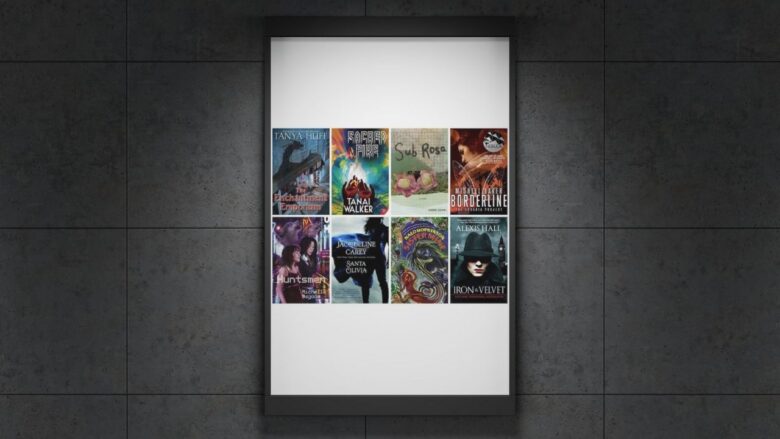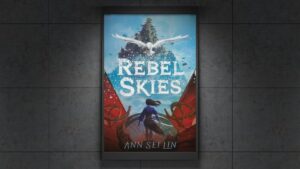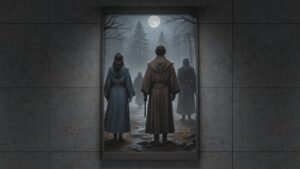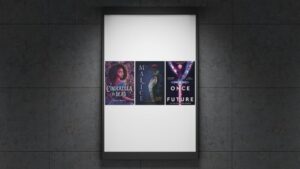Urban fantasy is a subgenre of speculative fiction where magical elements exist within a contemporary, often gritty, real-world setting. Think spellcasters navigating subway systems, shapeshifters working office jobs, or portals to other realms hidden in back alleys. Its appeal lies in the intersection of the familiar and the fantastical — the idea that magic might be lurking just beneath the surface of everyday life.
When LGBTQIA+ characters are centered in these stories, the genre takes on deeper resonance. Queer identities often involve navigating dual realities: an internal truth and an external world that doesn’t always reflect or accept it. Urban fantasy, with its secret magical societies and hidden powers, mirrors this beautifully. These stories become metaphors for queer self-discovery, resilience, and chosen family.
Blending modernity with magic also allows for fresh, genre-bending storytelling. It opens space for characters who are complex, culturally diverse, and deeply human — even when they’re casting spells or communing with ghosts. In this context, queer narratives can shine in ways that are both grounded and otherworldly.
In this curated list, you’ll discover some of the best LGBTQIA+ urban fantasy books where magic collides with modern life. These are stories where queer characters don’t just survive — they lead, love, and reshape the worlds around them. Whether you’re drawn to necromancers in city morgues, superhero teens, or sentient cities fighting back, there’s something here for every reader craving powerful queer representation woven into enchanting, contemporary fantasy.
What Defines Great LGBTQIA+ Urban Fantasy
Urban fantasy stands apart for its fusion of everyday life with supernatural elements. These stories are grounded in contemporary settings — cities, suburbs, or familiar modern landscapes — where magic hides just beneath the surface. You’ll often find secret magical communities, hidden portals, or supernatural beings existing alongside unaware civilians. This genre thrives on the tension between the mundane and the mystical, asking what it means to live a normal life in an extraordinary world.
In LGBTQIA+ urban fantasy, that same tension is enriched by layers of identity, belonging, and self-discovery. Great queer urban fantasy doesn’t just include LGBTQIA+ characters — it centers them, treating their identities as integral parts of the narrative rather than side notes. Authentic representation means showing queer characters as fully developed people: heroes, villains, romantics, rebels, and everything in between. It also means reflecting the true diversity of the queer community across race, culture, gender identity, and experience.
What makes these stories especially powerful is how naturally LGBTQIA+ themes fit within fantasy. Queer characters often straddle multiple worlds, navigating visibility, secrecy, transformation, and acceptance — all core themes of urban fantasy. A trans character might see their gender journey echoed in shape-shifting magic. A queer teen might find liberation in discovering hidden powers. These metaphors aren’t just poetic — they’re emotionally resonant, turning fantastical plots into deeply personal narratives.
Ultimately, great LGBTQIA+ urban fantasy uses magic not only as a tool for storytelling but as a mirror for identity. It invites readers to imagine new possibilities — not just in magical worlds, but in their own lives and communities.
Top LGBTQIA+ Urban Fantasy Books to Add to Your TBR
If you’re searching for urban fantasy that blends modern settings with magical intrigue — all while centering LGBTQIA+ characters — the following titles deliver on every level. Each book on this list offers a unique take on magic, identity, and the complexities of living between worlds.
Cemetery Boys by Aiden Thomas
LGBTQIA+ Representation: Latinx trans boy protagonist, queer romance Synopsis: Yadriel, a trans boy determined to prove himself to his traditional Latinx family, summons a ghost who refuses to leave — and might hold the key to solving a murder. What Makes It Stand Out:Cemetery Boys combines heartfelt identity affirmation with vivid cultural magic. It’s a touching story of love, family, and self-worth set against a backdrop of spirits and brujería in contemporary Los Angeles.
The City We Became by N.K. Jemisin
LGBTQIA+ Representation: Multiple queer characters across identities Synopsis: In this surreal and powerful novel, the five boroughs of New York City come to life through human avatars who must band together to defend the city from an interdimensional threat. What Makes It Stand Out: Jemisin transforms the city itself into a living, breathing character. The book’s unapologetic queerness, cultural diversity, and layered social commentary make it a bold and original entry in urban fantasy.
Not Your Sidekick by C.B. Lee
LGBTQIA+ Representation: Bisexual protagonist, queer romance Synopsis: Jess Tran, daughter of superheroes, is determined to carve out her own path in a world dominated by powers and expectations — even if it means working for a villain. What Makes It Stand Out: This YA gem blends superhero lore with a heartfelt coming-of-age story. The book delivers a fun, hopeful narrative that normalizes queerness and challenges the idea of legacy and identity.
The Sunbearer Trials by Aiden Thomas
LGBTQIA+ Representation: Trans boy protagonist, nonbinary and queer demigods Synopsis: In a world inspired by Mexican mythology, trans teen demigod Teo is unexpectedly chosen to compete in the Sunbearer Trials — a brutal contest with divine consequences. What Makes It Stand Out: Think The Hunger Games meets Percy Jackson, but queer, vibrant, and full of cultural richness. Aiden Thomas brings nuance, humor, and emotional stakes to a thrilling magical competition.
Into the Drowning Deep by Mira Grant
LGBTQIA+ Representation: Lesbian protagonist Synopsis: A crew of scientists and specialists sets out to uncover the truth behind a vanished expedition — and encounters deadly, intelligent mermaids in the Mariana Trench. What Makes It Stand Out: While more science fantasy than traditional urban fantasy, its contemporary setting and mythic horror elements make it a standout. It’s smart, terrifying, and offers nuanced queer representation alongside deep-sea suspense.
Magic for Liars by Sarah Gailey
LGBTQIA+ Representation: Bisexual protagonist Synopsis: Ivy Gamble, a non-magical private investigator, is drawn into a murder case at a secretive magical school — where her estranged sister teaches. What Makes It Stand Out: A noir-inspired mystery in a magical academic setting, this novel explores grief, estrangement, and identity with a sharp, darkly witty tone. The queer rep is understated but essential to Ivy’s complex character.
The Unspoken Name by A.K. Larkwood
LGBTQIA+ Representation: Sapphic romance, queer lead characters Synopsis: Csorwe, an orc priestess raised for sacrifice, escapes her fate to serve a powerful sorcerer — only to face betrayal, destiny, and love across dimensions. What Makes It Stand Out: This novel blends epic and cosmic fantasy elements with personal stakes and queer love. While more high fantasy in scope, its grounded character arcs and bold world-building make it compelling for urban fantasy fans seeking something more expansive.
These books showcase just how rich and varied LGBTQIA+ urban fantasy can be — from school mysteries to divine tournaments, sentient cities to supernatural science. Each one offers a fresh lens on magic, identity, and modern life, making them essential additions to any TBR.
Honorable Mentions
In addition to the standout titles featured above, there are several other LGBTQIA+ urban fantasy and adjacent works that are well worth your attention. These books continue to expand the genre with innovative storytelling, rich world-building, and compelling queer representation.
- The Midnight Bargain by C.L. Polk – A Regency-inspired fantasy where a bisexual heroine fights against patriarchal magical traditions to claim her own power and love.
- The Raven Cycle by Maggie Stiefvater – A dreamy YA series that follows a group of teens unraveling magical mysteries in small-town Virginia, featuring a slow-burn queer romance.
- Unclean Spirits by M.L.N. Hanover – A gritty supernatural thriller that explores dark magic and secret cabals in modern-day Denver, including queer supporting characters in a morally complex world.
- The Black Veins by Ashia Monet – A fast-paced urban fantasy road trip with a Black queer protagonist and a found family of magical teens, fighting to stay alive and stay together.
- The Bone Shard Daughter by Andrea Stewart – While more epic in scale, this fantasy includes queer main characters and an inventive magic system in a decaying empire.
- The Lost Coast by Amy Rose Capetta – A lyrical YA novel about queer witches, enchanted redwoods, and a missing girl in a Northern California town steeped in magical secrets.
- Of Fire and Stars by Audrey Coulthurst – A fantasy romance between two princesses navigating court politics and forbidden magic, set in a richly imagined world.
These honorable mentions further highlight the diversity and creativity that LGBTQIA+ authors and stories bring to the fantasy genre — each one offering a unique perspective on magic, identity, and the complexity of living in (or between) worlds.
Why These Stories Matter
Queer visibility in speculative fiction — especially in urban fantasy — plays a powerful role in shaping inclusive narratives and challenging traditional storytelling norms. For a long time, LGBTQIA+ characters were either erased from fantasy worlds or relegated to minor roles. Today, authors are reclaiming space by creating stories where queer characters are not just present, but central to the action, the magic, and the emotional heart of the plot.
These stories matter because they reflect real experiences through fantastical lenses. Urban fantasy, with its modern settings and familiar landscapes, brings that magic closer to home. By setting supernatural tales in cities, suburbs, and contemporary cultures, these books allow readers to see themselves more clearly — navigating identity, love, loss, and growth in worlds that feel possible. For LGBTQIA+ readers, this blend of realism and wonder validates their journeys and offers narratives of empowerment, survival, and joy.
Modern urban fantasy also holds space for complex intersectionality. Queer characters of color, trans and nonbinary heroes, disabled protagonists — all have begun to find their place in the genre. This level of inclusion is vital not only for representation but for storytelling richness. The more voices we include, the more powerful and imaginative the genre becomes.
For readers outside the LGBTQIA+ community, these books offer insight and empathy. They help normalize queer lives and expand understanding through compelling, character-driven fantasy. Choosing to read diversely isn’t just about finding great stories — it’s also about supporting the authors who are changing the landscape of publishing.
By picking up books that blend queerness, magic, and modern life, readers take part in a broader cultural shift: one that affirms that every identity deserves to see itself reflected in stories — especially the ones where anything is possible.
Where to Find These Books
Finding and supporting LGBTQIA+ urban fantasy books is easier than ever, thanks to the growing visibility of queer authors and stories across publishing platforms. Whether you prefer browsing shelves or shopping online, there are several ways to discover and purchase these titles while actively supporting the communities behind them.
1. Independent Bookstores and Queer-Owned Shops Shopping at indie bookstores helps sustain local economies and often offers a more curated, personalized experience. Many independent stores highlight LGBTQIA+ authors and stock urban fantasy titles with queer representation. Some queer-owned bookstores also specialize in LGBTQIA+ literature, such as:
- Loyalty Bookstores (Washington, D.C.)
- Bluestockings Cooperative (New York City)
- Prism Bookshop (online queer-focused bookstore) Ask your local bookstore for recommendations or request titles they may not currently carry — most are happy to order books upon request.
2. Online Retailers and Platforms with Inclusive Curation For broader accessibility, online platforms like Bookshop.org allow you to support indie bookstores while shopping online. You can also browse curated lists focused on LGBTQIA+ fantasy through sites like:
- Libro.fm (audiobooks supporting independent bookshops)
- The Lesbrary and LGBTQ Reads (blogs featuring queer book lists and reviews)
- StoryGraph (book tracking and recommendation tool with identity-based filters)
3. Libraries and Digital Lending Public libraries often carry many of these titles, and digital apps like Libby and Hoopla make borrowing eBooks and audiobooks convenient. Suggesting titles to your library helps expand access for others in your community.
4. Tips for Supporting Queer Authors and Marginalized Voices
- Buy books during release week. Early sales impact visibility and future opportunities for authors.
- Leave reviews. Posting ratings or reviews on Goodreads, Amazon, or StoryGraph helps boost discoverability.
- Follow and share on social media. Amplifying queer authors and their work introduces new readers to inclusive stories.
- Support small presses. Publishers like NineStar Press, Bold Strokes Books, and Interlude Press focus on LGBTQIA+ literature and often publish lesser-known but outstanding queer urban fantasy.
Choosing where and how you buy books is a meaningful way to support LGBTQIA+ creators. Every purchase, review, or recommendation helps ensure that more diverse, magical, and inclusive stories continue to reach readers around the world.
Conclusion
Urban fantasy thrives on the interplay between the everyday and the extraordinary — and when it centers LGBTQIA+ characters, that magic becomes even more meaningful. These stories breathe new life into the genre by blending modern-day realities with powerful, transformative elements: from haunted cities and magical tournaments to queer superheroes and sentient boroughs.
Each book in this guide proves that fantasy doesn’t need to escape reality — it can reflect it, challenge it, and reimagine it. When queer identities are not just included but celebrated, the result is richer, more emotionally resonant storytelling that speaks to a wider range of readers.
If you’re looking to diversify your reading, explore new perspectives, or simply enjoy excellent fantasy fiction, LGBTQIA+ urban fantasy offers something truly special. Let this be your invitation to seek out magical stories where queerness is not a twist — it’s the heart of the narrative.
Your next favorite book might just be hiding in a city where spells are real, secrets are sacred, and every shadow holds a little wonder. Happy reading!




